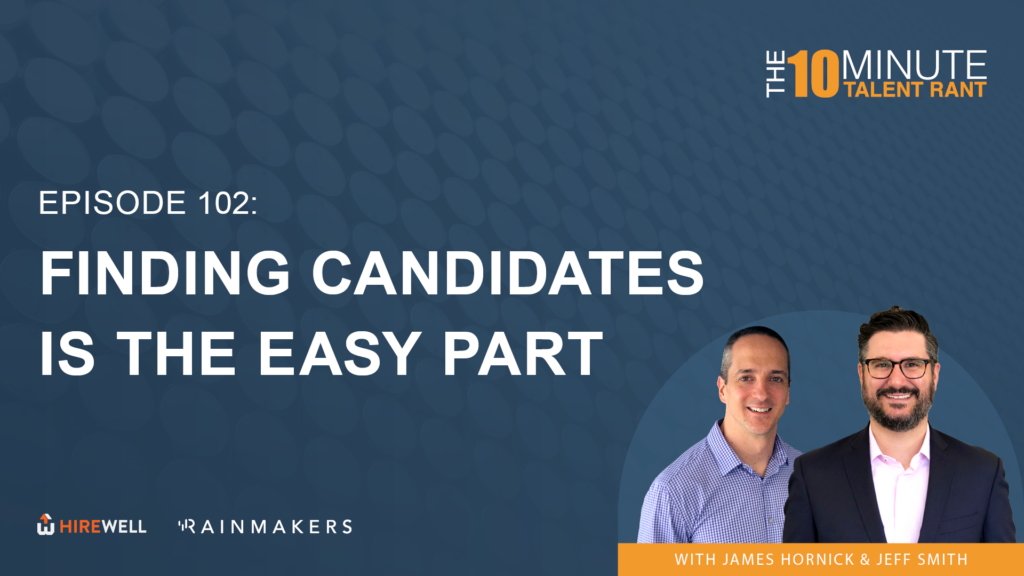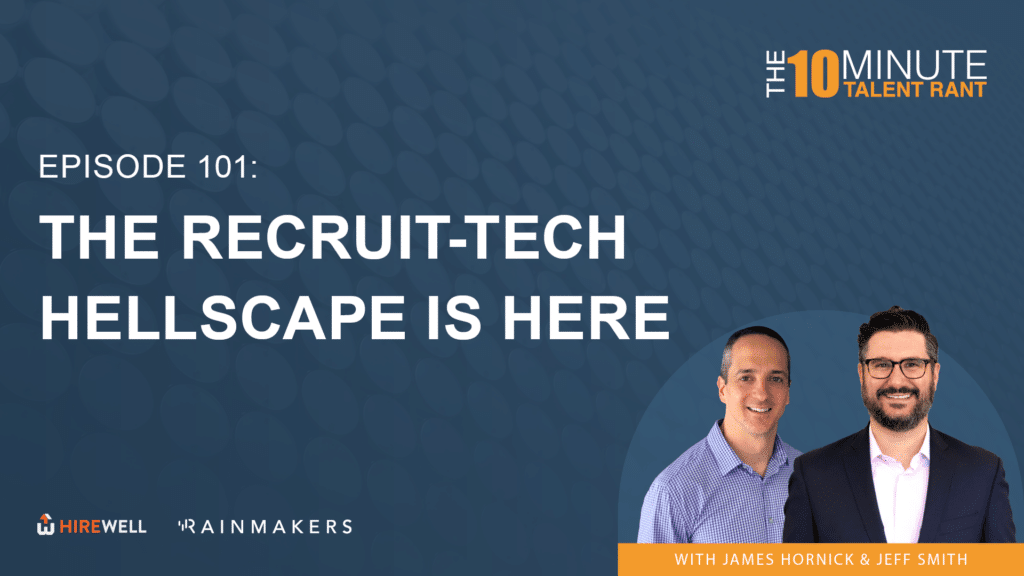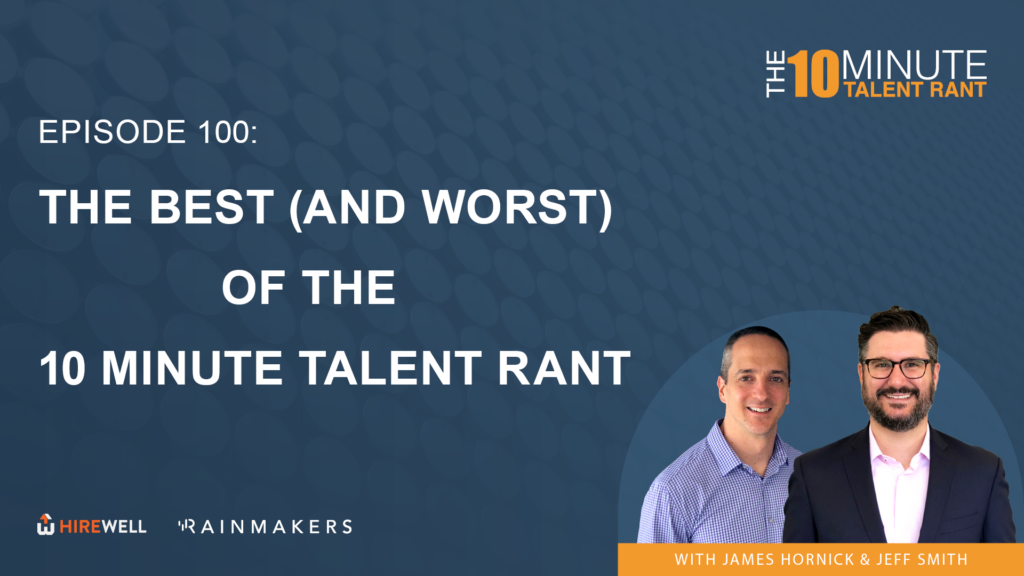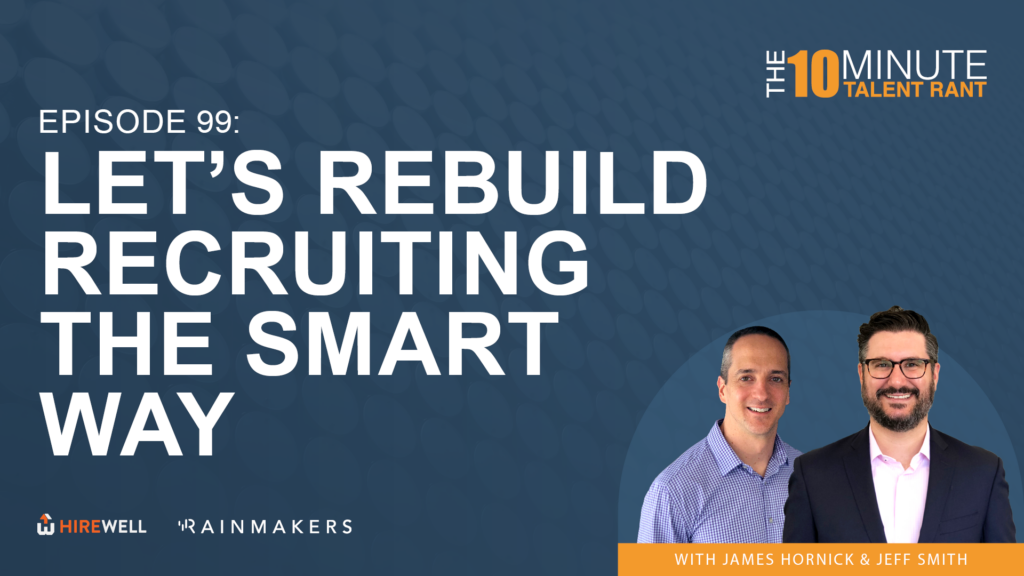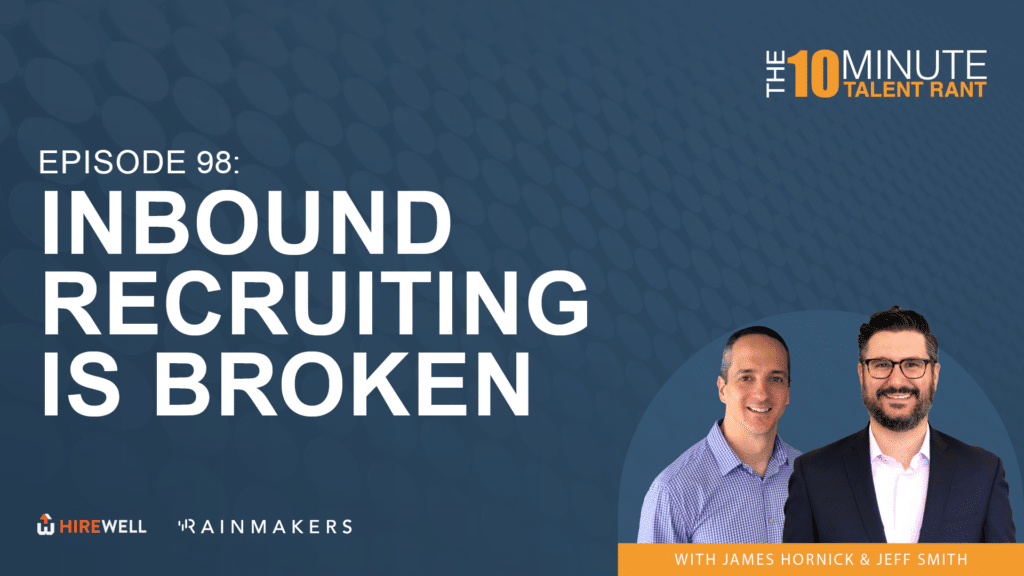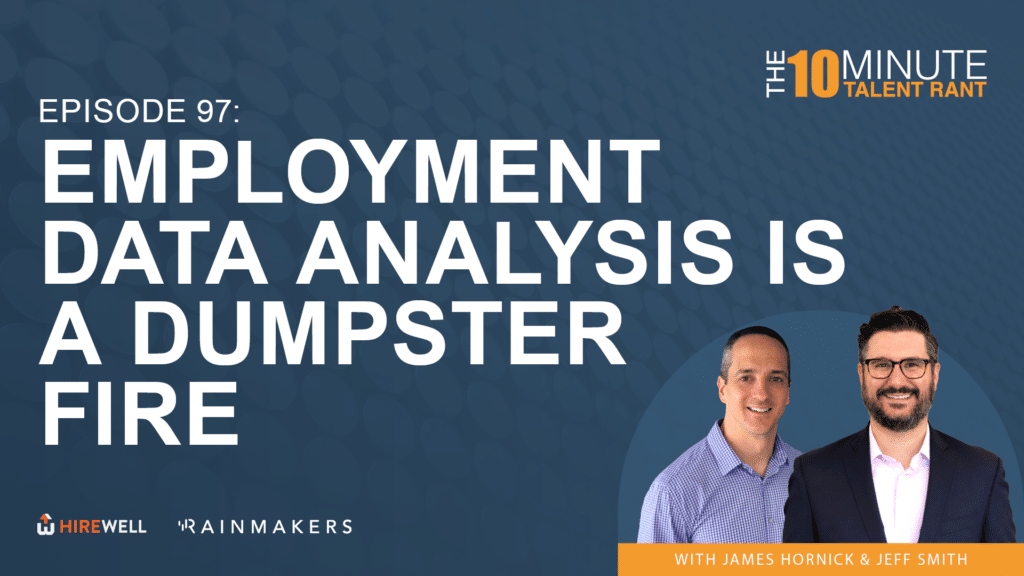The 10 Minute Talent Rant is live. I’m James Hornick brought to you by Jeff Smith and we are on the clock. The 10 Minute Talent Rant is our ongoing series where he break down things that are broken in the talent acquisition and hiring space, maybe even pitch a solution or two. Before we dig in, all of our content can be found on talentinsights.hirewell.com.
This week’s topic, should be a crowd pleaser, “No one understands recruiting but recruiters, volume one.” We don’t like- it’s kind of like when you, you don’t know there’s a sequel coming, but we know there’s a sequel coming to this one. Yeah, spoiler alert: there might not be a lot of takeaways on this one. But I think there are. I guess I’d like to say that you don’t have to have the title of recruiter to be a good recruiter.
And we want to preface that. It’s kind of a joke that when we say no one understands what we do, but there are a lot of good- I’ve met a lot of CEOs a lot of CTO’s that are great recruiters. But then we’ve also met a lot of people who think they know a lot about recruiting because they’re not in the role and really, they just make everything worse in terms of hiring.
And that’s kind of something we want to talk about today. Some commonly seen mistakes people make and this isn’t even unique to recruiting. I know it’s kind of a joke in the marketing space as well, too. There’s a lot of marketers that say like, well, every CEO thinks they know about marketing.
Except the ones who, you know, especially the ones who don’t. I think there’s just people have a skewed sense of things that seem conceptually easy to understand, but there’s a lot more particulars involved nets. We want to illustrate some of the worst case scenarios of where things go wrong. I mean, the funny example I heard someone say, it’s like, can you imagine a recruiter telling an engineering manager that their design sucks and it doesn’t work.
Yet, engineering managers have no problem telling the recruiter that like, “Hey, find me more candidates” after they already sent them the three best ones, you know? So we’ll kind of get into it here. Yeah. So yeah, I mean, I think that we had a laundry list but we condensed it down to like the seven that I think are the most tangible. I think, just think about things when we kind of are going through this,
like the normal stuff happens. You get a ton of turn downs, you have a process that’s either too long or in some small cases, too short. Candidates just don’t seem to be interested in your roles either at the front or back end of the funnel. What’s happening there? Let’s diagnose that.
And just overarchingly, like shit is not working at all, right? You’re frustrated with your recruiting team. You don’t understand what’s going on. Let’s get into these seven things. Hit us with number one, James. Alright. Number one may actually be two, but it’s like the opposite. So putting all your eggs in one basket, then going back to square one
versus window shopping and complete indecisiveness, which has the same net result. So I mean, the first time I’ve seen a million times, you know. A hiring manager will fall in love with this one candidate and all in, let’s push them through. There’s other people you could be talking to, let’s hold off on those.
Let’s see what happens with this- they’re totally going to accept. Yeah, they’re going to accept. This is great. You keep like another interview, another interview. This is going to work out. Let’s get the offer out there. Start to get some- you get a little worried when they don’t accept on the spot, you know?
And then they’re like, oh, I need some time to decide. And then it doesn’t work. And then you wasted 2, 3, 4 weeks who knows it was and you’re back to square one. Meanwhile, all the other candidates that were interested, now they’re not because they’ve been talking to other places and they thought you weren’t that into them
because you weren’t, and you’re truly back to square one. The flip side of that is, complete window shopping. So we actually had someone on our team. So this is a real world one. This is before she came to Hirewell, who went through six conversations with a company. Six? Yeah, six. Six conversations.
They were perfect for the role. Everything is like, this is going to work out. Then finally at the very end, they said their internal recruiter told her that, you know, we actually need some more specific recruiting experience. Which you’re like, okay, it took you six interviews to figure out I’m not a fit? But it gets better.
They actually then reached out about a month later and made her an offer. Field C-suite confirming that you’re a great fit only to find out you’re not a great fit, but then you are a good fit. So just like your inability to make a decision based on whatever- yeah. So don’t do it. Don’t do either of those. Next one.
Yeah. Yeah. We see this a lot. There’s this urgency right? Followed immediately by a complete slow play. And then also tangentially like interesting levels of gatekeeping from your hiring managers- when I say hiring managers as a recruiter. So think of it this way. If you’re asking your sourcers or recruiters
to let you review profiles before they are getting screened, like totally okay. I’m actually, I advocate for that. Just make sure that it’s structured in a way that it feels helpful and not judgmental. It’s really important that they still feel like you’re not kind of looking over their shoulder. Make sure that you’re clarifying that it’s not a gate-keeping exercise.
If you’re doing that though, don’t take your sweet ass time, please. Like get through the resumes in 24, 48 hours. Make sure that your sourcers and recruiters know who you’re supposed to talk to, who they’re supposed to talk to. Like you’re just compounding the problem if you take your time at the front end of that funnel.
Your recruiter’s going to move on to other stuff. Then you’re going to inevitably come back and say like, what’s going on here? And you stay on that hamster wheel. The other piece to this is, and we see it a lot is, oh my God, everything’s on fire. Yeah. I need 17 roles filled yesterday.
The recruiter runs out to market, get you eight to 10 qualified applicants- cancels everything else they’re doing in the meantime. So anyone else who needs to hire, like everything’s on the wayside cause this is the most important thing. And then what happens? Literally you’re screaming radio silence. Nothing. Nothing down the backend. Got you what you’re looking for and then nothing.
Yeah. What’s worse is almost invariably three to four weeks after that entire exercise, we will get the email that says, “Hey, I’d love to interview Sally, John and Paul. Are they still available?” And our response is no. They’re 100% not available. And even if they were, they have no interest in speaking with us again.
So what’s number three James? Time zones. Let’s talk about time zones for a second. So this is interesting because this is not something I ever thought would be like a top level vetting point, but it is nowadays. Like time zones is like a critical thing. Everyone’s remote, you know? I think that you know, we see people that have a bias towards like they want East Coast or they want West Coast time.
And the thing is I get it because your team’s based there and you need, especially- you need someone who can kind of work those hours and it’s important from an employee engagement standpoint because the last thing you want to do is have someone on the East Coast working West Coast hours or vice versa, and that messes up their work-life balance and whatnot.
So I get it, but here’s the thing. If you’re looking at it from a sheer talent availability standpoint to get the largest pool available, there are skillsets where no one’s going to argue it doesn’t make sense to have your customer success, your tech support spread across different time zones,
right? It just, if you’ve got clients in different areas, you have people who are supporting you, you want people working in those different areas. But once you take it like a step further and you just think about it from a business standpoint, wouldn’t it- do you really need everyone to work in the exact eight hour block? Nine hour block, 10 hour block, whatever it is. Like once you’re- it just seems to me that if you can get people on board for four to five hours of the day, at the same time, it’s from a process standpoint, it’s really not that hard to be able to structure things where you got people more geographically disperse across the four times zones in the US. But it’s the old addage
right? How do you figure out if things are, you know, if the work is happening and the answer is well, is the work getting done? Yeah. It’s not like you’re on, I should hope you’re not on eight hours of zoom calls the exact same time all day, you know. So, but anyways, I digress.
It’s just a talent availability thing. So yeah. Well and strategic business decision on what roles make sense to do that, anyway. Number four. Easy one, packaging 2, 3, 4, 8, 10, 12 jobs into one. Don’t do it. It’s a bad call. It’s a bad idea. And it’s not to say again, empathizing with like our entrepreneurial clients, like startups series A. Like I get it.
Like money is tight. You’ve got to make really smart decisions with your payroll. Bucketing things like SEM and ads, cool. Those are in the same realm, right. And for the right person, the right opportunity, that makes sense. Let’s not bucket accounting and business development. Let’s not. Like completely different skill sets.
You’re not going to have any availability from a candidate perspective and it just sounds like you’re being cheap to be quite honest. Yeah. All right. So another one, searching for the wrong damn thing all along. So there’s been times where we’ve seen people- I think this might happen a little more often in like more consultative or agency environments, but it could happen anywhere where there is a long interview process.
Let’s say it’s for like a product manager or something like that and they need to meet with a bunch of different people. And I mentioned kind of consultancies, maybe they have to meet with the end client or something like that and whatnot. And then after this long process, that final check box, you know what I mean?
Or maybe it’s even with the CEO, maybe it’s internally, you know what I mean? And they realize, you know what? This is actually the wrong skill, we don’t need a product manager. We need a project manager. And after you’ve already kind of told the candidate, you think this might actually work out and like, things all look good to go,
you realize you’re kind of back to square one. And we kind of said this before, plot twist, all this time you spent searching for the wrong job is time you weren’t spent searching for other things you actually need. There’s nothing a recruiter loves more than double work.
Yeah, why not? All right. Number six. In play prestige, RIP. Dead. Nobody cares. Nobody cares. If you are banking, the amount of times that we have heard, “Well the candidate, you know, I get it. I hear you. The candidate market is XYZ. The comp is this, but the right person’s going to want to work for us, you know?”
Our retort has become, you know what doesn’t pay the bills? Five star Glassdoor reviews. They put monetary value to that. They paid for a top 10 best place to work lists. Also doesn’t pay for your rent but. Yeah, get over yourselves. Shout out to our boy Mitch Sullivan. He had a great piece on this. This whole adage that companies are doing the job seeker population, some sort of favor for having an opening has got to go by the wayside.
Yeah. Number seven, last one we’ll go on here. Favoring inbound versus outbound. The correct answer is neither. It should be neither. It’s funny. We’ve seen scenarios on both sides where I was more familiar with the outbound one, but we’ve actually seen some scenarios where people are favoring more inbound candidates because they have a perception that they’re more excited because they’re more actively looking. They found our site and they’re really interested in our jobs specifically so they must be the better candidate. Versus if someone’s passive, meaning they aren’t actively looking, they don’t have the resume together. We had to hunt them down.
They must not be as into it. And I’ve seen it kind of go both ways. It’s just odd to me, especially like if you’re trying to hire a salespeople, you know what I mean? You should want people that are good at outbound and hunting people down. It’s kind of part of the job. It’s so counterintuitive
it’s ridiculous. Yeah. So you have to realize that like great recruiting is usually an effort between kind of both inbound and outbound. I could go on a separate tangent, maybe separate show about why you want to have a good brand that makes it easier when you do do the outbound recruiting, they’re more likely to get back to you. But realize that there shouldn’t be a bias either way between candidates we reach out to and headhunted versus people who sought after and found us. It really comes down to who’s the best talent,
so. And to your point, for the healthy balance is a mix of both. All right. We are short on clock. That’s a wrap for this week. Thanks for tuning into the 13 and a half Minute Talent Rant, part of the Talent Insights series, which is always available for replay on the talentinsights.hirewell.com as well as YouTube, Apple podcasts, Google podcasts, Spotify, and Amazon.
Jeff, thanks as always. Everyone out there, we’ll see you soon.







